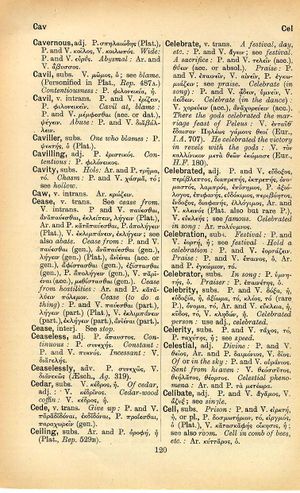cell: Difference between revisions
From LSJ
Τίς, ξένος ὦ ναυηγέ; Λεόντιχος ἐνθάδε νεκρὸν εὗρέ σ᾿ ἐπ᾿ αἰγιαλοῦ, χῶσε δὲ τῷδε τάφῳ, δακρύσας ἐπίκηρον ἑὸν βίον· οὐδὲ γὰρ αὐτὸς ἥσυχος, αἰθυίῃ δ᾿ ἶσα θαλασσοπορεῖ. → Who art thou, shipwrecked stranger? Leontichus found thee here dead on the beach, and buried thee in this tomb, weeping for his own uncertain life; for he also rests not, but travels over the sea like a gull.
mNo edit summary |
mNo edit summary |
||
| Line 3: | Line 3: | ||
===substantive=== | ===substantive=== | ||
[[prison]]: [[prose|P.]] and [[verse|V.]] [[εἱρκτή]], ἡ, or pl., [[prose|P.]] [[δεσμωτήριον]], τό, [[ | [[prison]]: [[prose|P.]] and [[verse|V.]] [[εἱρκτή]], ἡ, or pl., [[prose|P.]] [[δεσμωτήριον]], τό, [[εἱργμός]], ὁ ([[Plato]]), [[verse|V.]] [[κατασκαφής οἴκησις]], ἡ; see also [[room]]. | ||
[[cell in comb of bees]], etc.: [[Aristophanes|Ar.]] [[κύτταρος]], ὁ. | [[cell in comb of bees]], etc.: [[Aristophanes|Ar.]] [[κύτταρος]], ὁ. | ||
}} | }} | ||
Revision as of 14:47, 26 June 2020
English > Greek (Woodhouse)
substantive
prison: P. and V. εἱρκτή, ἡ, or pl., P. δεσμωτήριον, τό, εἱργμός, ὁ (Plato), V. κατασκαφής οἴκησις, ἡ; see also room.
cell in comb of bees, etc.: Ar. κύτταρος, ὁ.

